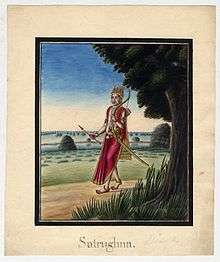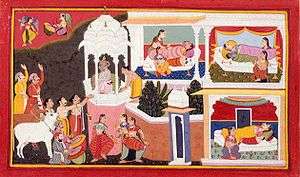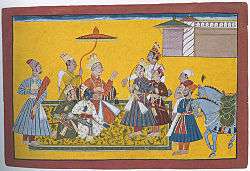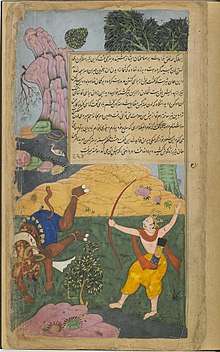Shatrughna
Shatrughna(Sanskrit: शत्रुघ्न, romanized: śatrughna, lit. 'killer of enemies'), also spelled as Shatrughan was the youngest brother of Lord Rama in the Hindu epic Ramayana. He is also known as Ripudaman. He is brother of Lakshmana. According to Valmiki Ramayana, Shatrughna is one half component of manifest Vishnu (Rama). Shatrughna also appears as the 412th name of Vishnu in Vishnu Sahasranama of Mahabharata.
| Shatrughna | |
|---|---|
 Shatrughna, the youngest brother of Rama | |
| Affiliation | Avatar of Sudarshan Chakra |
| Texts | Ramayana and its other versions |
| Personal information | |
| Parents | Dasharatha (father) Sumitra (mother) Kaushalya (step-mother) Kaikeyi (step-mother) |
| Siblings | Lakshmana (brother) Rama (half-brother) Bharata (half-brother) Shanta (step-sister) |
| Spouse | Shrutakirti |
| Children | Shatrughati Subahu |
| Dynasty | Raghuvanshi-Ikshvaku-Suryavanshi |
According to the Ramayana, Rama is the seventh avatar of Vishnu while Lakshmana, Bharata and Shatrughna are considered as part-incarnations of Sheshanaga, Sudarshan chakra and Shankha respectively.[1]
The Khuthan block of Jaunpur district of the Indian state of Uttar Pradesh is named after him.
Birth and family

Shatrughna was born to the virtuous king of Ayodhya, Dasharatha and his second wife, Queen Sumitra, princess of Kashi. Dasharatha's other two wives, Kaushalya and Kaikeyi, had sons as well. Kaushalya had Rama and Kaikeyi had Bharata, who were Shatrughna's half-brothers. Shatrughna's twin brother was Lakshmana. Shatrughna was married to Shrutakirti, daughter of Kushadhwaja, Janaka's younger brother. Thus, Shrutakirti was Sita's cousin. They had two sons - Shatrughati and Subahu.
Rama's exile

When Rama is exiled, Shatrughna drags Kaikeyi's old nurse Manthara(who was responsible for poisoning the queen's mind against Rama) and makes an attack to kill her, but he is restrained by Bharata who feels that Rama would not approve.
Bharata goes to Rama and asks him to come back to Ayodhya but Rama refuses. Bharata rules Ayodhya from Nandigramam and is an excellent leader, often referred to as the avatar of dharma. Though Bharata was the king designate of Ayodhya during Rama's exile, it was Shatrughna who took care of the administration of the whole kingdom, during Rama's absence. Shatrughna also was the only solace for the three Queen mothers during the absence of Rama, Lakshman and Bharata from Ayodhya.
Rebuked Manthara
Manthara appears only once in Ramayana after Rama's banishment. Having been rewarded by Kaikeyi with costly clothing and jewels, she is walking in the palace gardens when Bharata and his half-brother Shatrughna come upon her. Seeing her, Shatrughna flies into a violent rage over Rama's banishment and assaults her murderously. Kaikeyi begs Bharata to save her, which he does, telling Shatrughna that it is a sin to kill a woman and that Rama would be furious with them both if he does such a thing. He relents and the brothers leave, while Kaikeyi attempts to comfort Manthara.
The Slaying of Lavanasura

Although he plays a relatively minor role in the Ramayana, Shatrughna is important to the main story and goal of the epic. His chief exploit is the killing of Lavanasura the demon King of Madhupura (Mathura)[2], who was a nephew of Ravana, the King of Lanka, slain by Rama.
Lavanasura was the son of Madhu, the pious demon-king after whom the city of Madhupura was named. Madhu's wife and Lavanusara's mother Kumbhini was sister of Ravana. Lavanasura was holder of the divine Trishula (Trident) of Lord Shiva and nobody was able to kill him or prevent him from committing sinful activities.[3]
Shatrughna begged Rama and his elder brothers to allow him the opportunity to serve them by killing Lavanasura. Shatrughna killed the demon with an arrow imbibed with the power of Vishnu. After Lavanasura's death, Rama crowned him King of Madhupura.[4]
Retirement
After Rama, the seventh Avatar of Vishnu completes 11, 000 years of perfectly pious rule upon earth, he walks into the river Sarayu to return to his true and eternal Mahavishnu form. Bharata and Shatrughna follow him into the river and merge into Mahavishnu.
In popular culture
| Year | TV Series | Channel | Country | Played by |
|---|---|---|---|---|
| 1987–1988 | Ramayan (TV series) | DD National | India | Sameer Rajda |
| 1997-2000 | Jai Hanuman (1997 TV series) | DD Metro | India |
Hitesh Kumar |
| 2002 | Ramayan (2002 TV series) | Zee TV | India |
Amit Pachori |
| 2008 - 2009 | Ramayan (2008 TV series) | Ndtv Imagine | India |
Lalit Negi |
| 2015–2016 | Siya Ke Ram | Star Plus | India | Pratham Kunwar |
| 2019–2020 | Ram Siya Ke Luv Kush | Colors TV | India | Akhil Kataria |
Temples
- Shatrughna Temple at Payammal in Thrissur District of Kerala
- Shatrughna Temple at Muni Ki Reti, Rishikesh
- Shatrughna Temple near Kans-tila, Mathura, UP
References
- Naidu, S. Shankar Raju; Kampar, Tulasīdāsa (1971). A comparative study of Kamba Ramayanam and Tulasi Ramayan. Shank. University of Madras. pp. 44, 148. Retrieved 21 December 2009.
- Pargiter, F.E. (1972). Ancient Indian Historical Tradition, Delhi: Motilal Banarsidass, p.170.
- Kumar, Maltinandan. Chalein Such Ki Aur (in Hindi). Notion Press. ISBN 978-93-5206-582-0.
- Agarwal, Meena (22 September 2016). Tales From The Ramayan. Diamond Pocket Books Pvt Ltd. ISBN 978-93-5261-304-5.
.jpg)
